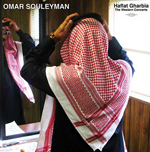|
|
 |
Dusted Reviews
Artist: Omar Souleyman Album: Haflat Gharbia (The Western Concerts) Label: Sublime Frequencies Review date: Sep. 8, 2011 |

|
|
|
 |
A stretch of four years and three albums shouldn’t be any big shakes for an artist with a 17-year career and over 500 albums under his belt. Still, there’s little question that the 2007 release of Highway to Hassake marked a significant moment in the career of Omar Souleyman, and that what’s happened to his career since is unlike anything he’d experienced in the 13 prior. The Syrian singer has long been a staple of CD and cassette kiosks in his homeland, and is a figure of some renown across the Arab world, but before 2007, he’d remained largely a regional celebrity who worked parties and weddings to make his money. As soon as Western ears heard the first few seconds of “Leh Jani,” the barnburner that opens Highway to Hassake, though, things began to change. Only a few short years after Souleyman was unexpectedly approached by Sublime Frequencies’ Mark Gergis, this wedding singer -- a man who’d never been outside of the Arab world -- found himself traveling to Europe and North America, performing at huge outdoor festivals and packed rock clubs, playing for crowds who’d he’d never even dreamt might hear his music, much less adore it.
Haflat Gharbia documents these tours, culling live tracks from between 2009 and 2011 recorded in Australia, Europe and the United States. Souleyman’s signature sound is a bracingly modern synthesis of Syrian Dabke with Kurdish, Turkish and Iraqi folk traditions, and while most of us this side of the Bosphorus can’t latch on to the subtleties of Souleyman’s stylistic fusion, it doesn’t dampen our ability to enjoy it. By this time, we know what to expect: Souleyman’s distinctive voice, at turns gruffly jubilant or earnestly romantic, the incredibly nimble fingers of keyboardist Razid Sa’id, and the speedy, slithering electric saz of Ali Shaker, combining in a raucous new take on old sounds. Souleyman’s albums have always consisted primarily of live recordings, so in this way Haflat Gharbia falls in line with Sublime Frequencies’ earlier offerings, though the fidelity here is clearer and brighter than much of the previously compiled material. The opener “Mawal Hejaz,” with its gravitas befitting an invocation, the club ready and bass-heavy “Mendel,” and the frenetic rush of “Haram” sound spectacular; the charming grit of some of Souleyman’s older material is nowhere to be found. The long bus trips, culture shock, and other rigors of touring seem to have had no effect on our heroes -- these are top shelf performances, one and all.
For Souleyman fans, there’s little downside to Haflat Gharbia, but there’s simply no recapturing the magic of the first time that “Leh Jani” burst from the speakers. It can’t be denied that part of Souleyman’s appeal back in 2007 was that of novelty. His look, his music and his demeanor combined to enthrall listeners and find fans in high places (Bjork is such an aficionado that she enlisted him to create one of the remixes on The Crystalline Series, alongside Matthew Herbert and others). As listeners outside of the Arab world have become more familiar with Souleyman and his work, there seems an unavoidable diffusion of enthusiasm for some; even the most unique and unexpected music loses its sheen to those who get off on the different and the new. Any aspiring Souleyman completists (good luck!) or diehards will lap these tracks up, but Haflat Gharbia offers less to entice Omar’s more casual fans.
Souleyman can release hundreds of albums in his homeland, because so many are event-specific -- not just live performances, but commemorations, with the names of the bride and groom in the songs, or with references in the on-the-spot lyrics (a poet is often present to compose on the fly, and whisper lines into Souleyman’s ear onstage) to the day’s event and/or those in attendance. The majority of Western listeners lose this facet of Souleyman’s music. For most, the translated title is the only indication of a song’s traditional, often romantic, lyrical content, which is frequently at odds, stylistically, with the music’s more modern sound.
One certainly needn’t have a degree in ethnomusicology or speak seven languages to enjoy Haflat Gharbia. After all, underneath all of that exotic veneer is music with an infectious energy that’s just plain fun to listen to. But it will be interesting what Souleyman and Sublime Frequencies do next. They could continue to reissue old songs on new compilations for years, even decades. But I imagine that Western listeners will be more fickle than their Arab counterparts in this case. Bands like Konono No. 1, Group Doueh and Tinariwen share the same situation – after existing just fine for decades with a particular audience, they now find themselves playing all over the world. Suddenly they’re popular across oceans, and trips to North America seem almost mandatory yearly jaunts. It will be interesting to see what effect this newfound fame has on their music, and their careers. Souleyman, Sa’id, and Shaker have got the goods, there’s no doubt about that. But it remains to be seen whether Western audiences will continue to buy them, or pass them by for the next new sound.
By Adam Strohm
|







